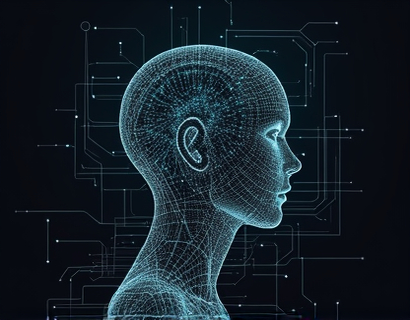AI-Powered Imaginative Companions: Enhancing Childhood Creativity and Emotional Well-Being
In recent years, the integration of artificial intelligence in children's play and emotional development has opened new avenues for enhancing creativity and emotional well-being. AI-powered imaginative companions, often referred to as digital friends or imaginary friends, are revolutionizing the way children interact with technology. These digital entities are not mere games or apps; they are sophisticated tools designed to foster imaginative play, support social skills, and provide a safe space for emotional exploration.
The Rise of AI-Driven Imaginary Friends
The concept of imaginary friends is not new. For generations, children have created companions in their minds to play with, confide in, and learn from. However, the advent of AI technology has brought a new dimension to this timeless practice. AI-driven imaginary friends are digital entities that can adapt to a child's personality, interests, and emotional needs, offering a personalized and dynamic companionship experience.
These digital companions are powered by advanced algorithms and machine learning models that enable them to understand and respond to a child's inputs in a meaningful way. They can engage in conversations, tell stories, play games, and even provide comfort during difficult times. The key advantage of AI-driven imaginary friends is their ability to evolve and grow alongside the child, ensuring a long-term and enriching relationship.
Personalization as a Core Feature
One of the most significant benefits of AI-powered imaginary friends is their capacity for personalization. Each digital companion is tailored to the individual child, taking into account their unique personality traits, preferences, and developmental stage. This personalization ensures that the interactions are relevant and engaging, which is crucial for fostering creativity and emotional growth.
For instance, a child who is shy and introverted might have a digital friend that encourages them to express themselves more openly, while a child who is highly energetic might have a companion that engages in fast-paced, action-packed activities. The AI system continuously learns from the child's interactions, refining its responses and behaviors to better meet the child's needs over time.
Fostering Imaginative Play
Imaginative play is a fundamental aspect of childhood development. It allows children to explore their creativity, solve problems, and develop cognitive and social skills. AI-driven imaginary friends enhance this process by providing a versatile and interactive platform for imaginative activities.
These digital companions can transform any setting into a world of endless possibilities. Whether it's building a castle in a virtual kingdom, going on a space adventure, or solving a mystery, the AI companion adapts to the child's ideas and expands the play scenario accordingly. This not only stimulates the child's imagination but also encourages them to think creatively and think outside the box.
Moreover, the AI's ability to generate new scenarios and challenges keeps the play experience fresh and exciting. This constant novelty helps maintain the child's interest and engagement, which is essential for the developmental benefits of imaginative play.
Supporting Social Skills Development
Social skills are critical for a child's success in both personal and professional life. AI-powered imaginary friends play a vital role in helping children develop these skills in a safe and controlled environment. Through interactions with their digital companions, children can practice communication, empathy, and cooperation.
For example, a child can engage in role-playing scenarios where they take on different roles and perspectives, learning to understand and respect others' feelings and viewpoints. The AI companion can provide feedback and guidance, helping the child navigate complex social situations and build confidence in their social interactions.
Additionally, these digital friends can facilitate interactions with other children, either through multiplayer modes or shared virtual spaces. This can be particularly beneficial for children who struggle with social interactions in the real world, providing them with a supportive and non-threatening environment to practice and improve their social skills.
Creating a Safe Emotional Space
Emotional well-being is as important as cognitive and social development. AI-driven imaginary friends offer a safe and nurturing space for children to explore and express their emotions. In a world where children often face various stressors and challenges, having a reliable and understanding companion can be incredibly reassuring.
These digital companions are designed to be empathetic and supportive, providing a listening ear and words of encouragement. They can help children process difficult emotions, such as sadness, anger, or fear, by offering comfort and guidance. The AI's ability to recognize and respond to emotional cues ensures that the interactions are sensitive and appropriate.
Moreover, the anonymity of digital interactions can make it easier for children to open up about their feelings without the fear of judgment. This can lead to more honest and meaningful conversations, fostering a deeper emotional connection between the child and the AI companion.
Enhancing Parent-Child Interaction
The introduction of AI-powered imaginary friends can also positively impact the relationship between parents and children. These digital companions can serve as a bridge, facilitating more meaningful and engaging interactions between parents and their children.
Parents can participate in the play sessions, observing and guiding their child's interactions with the AI companion. This shared experience can strengthen the parent-child bond and provide valuable insights into the child's thoughts, feelings, and developmental progress. Additionally, the AI's ability to offer educational content and learning activities can complement the parent's efforts in nurturing their child's intellectual growth.
Furthermore, the data and insights generated by the AI system can be valuable for parents, helping them understand their child's interests and emotional needs better. This information can inform parenting strategies and support a more tailored and effective approach to child development.
Addressing Concerns and Ethical Considerations
While the benefits of AI-powered imaginary friends are numerous, it is essential to address potential concerns and ethical considerations. One primary concern is the screen time associated with digital interactions. However, when used judiciously and in moderation, these digital companions can coexist with other forms of play and learning, ensuring a balanced and healthy lifestyle for the child.
Another consideration is the quality and integrity of the AI systems. It is crucial that these digital companions are developed with a strong focus on child safety, privacy, and ethical standards. Developers must ensure that the AI respects boundaries, avoids inappropriate content, and provides a positive and enriching experience.
Transparency is also key. Parents and guardians should be informed about how the AI works, the data it collects, and how it uses this data to personalize the experience. Clear guidelines and user controls should be provided to give adults the ability to manage and monitor their child's interactions with the digital companion.
Future Prospects and Innovations
The field of AI-powered imaginative companions is rapidly evolving, with ongoing research and development promising even more advanced and sophisticated digital friends in the future. One area of innovation is the integration of augmented reality (AR) and virtual reality (VR) technologies, which can create more immersive and interactive experiences for children.
AR and VR can transport children into fully realized virtual worlds where they can interact with their AI companions in a more tangible and engaging way. This could further enhance the creative and emotional benefits of these digital friends, making the play experience more vivid and memorable.
Another promising direction is the incorporation of multi-agent systems, where multiple AI companions can interact with each other and with the child. This could simulate more complex social scenarios and provide a richer, more dynamic play environment. Children could engage in group activities, collaborate on projects, and develop a deeper sense of community and cooperation.
Conclusion
AI-powered imaginative companions represent a significant leap forward in the realm of childhood development. By providing personalized, interactive, and emotionally supportive digital friends, these technologies are transforming the way children play, learn, and grow. As the field continues to advance, the potential for positive impact on childhood creativity and emotional well-being is immense.
While it is important to approach these innovations with caution and consideration, the benefits they offer are undeniable. For parents, guardians, and educators, embracing AI-driven imaginary friends can be a valuable tool in nurturing the next generation of creative, socially adept, and emotionally resilient individuals.











































